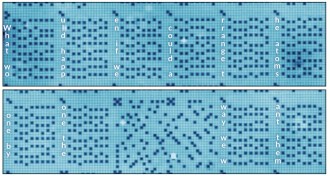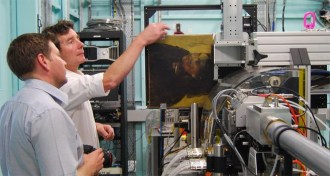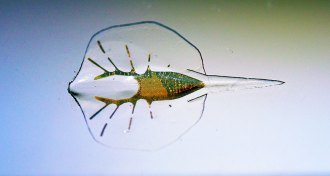Tech
Sign up for our newsletter
We summarize the week's scientific breakthroughs every Thursday.
-
 Computing
ComputingShayan Oveis Gharan finds the shortest route to success
Theoretical computer scientist Shayan Oveis Gharan has identified connections between unrelated fields to tackle the traveling salesman problem.
-
 Physics
PhysicsTenio Popmintchev fits X-ray laser on a tabletop
Laser physicist Tenio Popmintchev has created a Swiss-army-knife tool made of light.
-
 Health & Medicine
Health & MedicineActivity trackers fall short in weight-loss trial
In a two-year study, wearable activity monitors didn’t help young adults lose more weight.
-
 Tech
TechSpaceX rocket explodes on Florida launchpad
SpaceX has lost a Falcon 9 rocket and its satellite payload in a standard prelaunch test.
-
 Microbes
MicrobesBacteria display qualities that a mother would love
Editor in chief Eva Emerson discusses big lessons we can learn from some of Earth's smallest organisms.
By Eva Emerson -
 Tech
TechReaders respond to terrorism’s roots
Readers respond to the July 9, 2016, issue of Science News with questions on terrorism, dog evolution and more.
-
 Neuroscience
NeuroscienceWhat Donkey Kong can tell us about how to study the brain
Neuroscience tools failed to reveal much about a simple microprocessor. What can they really tell us about the brain?
-
 Computing
ComputingSupersmall device uses individual atoms to store data
Scientists manipulate chlorine atoms to store data on a supersmall device.
-
 Chemistry
ChemistryX-rays reveal portrait hiding beneath Degas masterpiece
X-ray technique reveals an additional painting hiding behind Edgar Degas’ "Portrait of a Woman."
-
 Tech
TechSPIDER shrinks telescopes with far-out design
Researchers hope new approach to interferometry and photonics will replace standard telescopes and long-range cameras where room is scarce.
-
 Tech
TechLight-activated heart cells help guide robotic stingray
Layers of silicone, gold and genetically engineered rat heart cells make up the body of a new stingray robot that can swim in response to light.
By Meghan Rosen -
 Psychology
PsychologyMoral dilemma could put brakes on driverless cars
Driverless cars race into a moral conflict over saving passengers or pedestrians.
By Bruce Bower